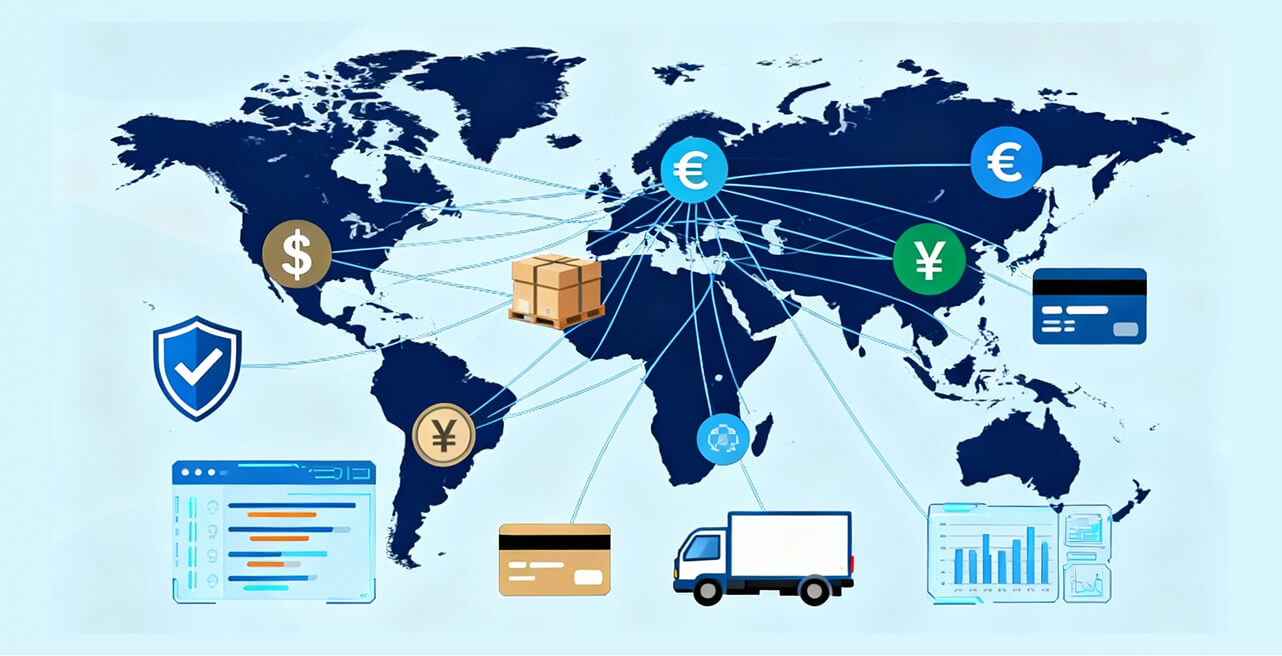What’s stopping your business from reaching its full potential? If you’re not expanding beyond your home market, you might be leaving massive opportunities on the table.
The truth is, businesses that go global have the chance to tap into new customer bases, diversify revenue streams, and build resilience against economic downturns. But—and this is a big one—global expansion is not as simple as shipping products overseas and hoping for the best.
From choosing the right market entry strategy to navigating international logistics and compliance, every decision impacts your success.
That’s exactly what we’re going to cover. In this guide, we’ll break down the top global expansion strategies that will help your business scale smartly and sustainably—without unnecessary risks or costly missteps.
Global Expansion Strategies: What You Need to Know
Times have changed, and expanding into international markets isn’t just for corporate giants anymore.
With the rise of digital commerce, supply chain advancements, and business-friendly policies in emerging economies, more companies—big and small—are making their mark globally.
But don’t be fooled: scaling internationally requires more than just ambition. It demands strategy, market insight, and a solid operational plan.
A strong global expansion strategy answers key questions:
- Which markets have the highest potential for your business?
- What legal and logistical hurdles could slow you down?
- How do you ensure your brand resonates with local audiences?
- Can you scale profitably without overextending resources?
Many businesses jump into international expansion too quickly, only to be blindsided by regulatory red tape, cultural missteps, or supply chain nightmares. To avoid these pitfalls, it’s essential to develop well-structured global market expansion strategies—not just to enter new markets, but to thrive in them.
Why Smart Businesses Invest in Global Expansion Strategies
Expanding globally isn’t easy. It takes time, money, and a whole lot of planning.
But why do businesses continue to push into international markets? Because when done right, the benefits of global expansion far outweigh the challenges.
The benefits of global expansion
- Access to new customers: Your home market has limits. Expanding internationally allows you to tap into fresh demand and diversify revenue streams.
- Stronger brand presence: A global footprint enhances credibility. Companies that operate in multiple regions are often seen as more established and trustworthy.
- Reduced dependency on one market: Economic downturns, supply chain disruptions, or regulatory changes in one country won’t sink your entire business.
- Economies of scale – Expanding globally can lower production costs, improve supply chain efficiency, and increase profitability.
- Access to Talent: Global hiring allows businesses to tap into new skill sets and labor markets, sometimes at lower costs.
- Competitive advantage: Entering new markets before your competitors do can position you as an industry leader.
The cost of staying local
Sticking to one market might feel like the safer option, but in reality, it’s one of the riskiest decisions a business can make.
Companies that don’t expand often face:
- Stagnation: A saturated local market limits revenue potential, leaving businesses with little room for growth.
- Increased Competition: Staying local doesn’t mean competitors will do the same. Global players entering your home market can quickly erode your market share.
- Missed Opportunities: Countries with rising consumer spending, like India and Southeast Asia, offer massive growth potential—but only for businesses willing to take the leap.
- Lack of Innovation: Operating in just one market often leads to a narrower perspective, limiting opportunities to innovate. When companies expand globally, they’re exposed to diverse consumer preferences, cultural trends, and technological advancements, all of which can inspire new ideas and solutions.
In short, the purpose of global expansion isn’t only to grow—it’s to survive and thrive in an increasingly interconnected world.
In the next section, we’ll dive into the first (and arguably most important) step: choosing the right market entry strategy. If this step is off, everything else could fall apart.
Top 8 Global Expansion Strategies for 2025
Pick your market entry strategy wisely
When it comes to global expansion, choosing the right market entry strategy is one of the most important decisions. It's not just about entering a new market; it's about doing so in a way that aligns with your business goals, resources, and risk tolerance.
Most common market entry strategies:
- Direct Investment: Establishing a new, wholly-owned subsidiary in the target market.
- Joint Ventures: Partnering with a local firm to share resources and knowledge.
- Franchising: Granting a foreign entity the rights to use your brand and business model.
- Exporting: Selling your products directly into foreign markets.
- Licensing: Allowing a foreign company to produce and sell your product.
- Wholly Owned Subsidiaries: Establishing a fully owned company in the target market.
Here’s a brief overview showing the pros and cons of each strategy:
At Filuet, we understand that choosing the right market entry strategy is crucial for success.
Our team offers comprehensive consulting services to help you assess your options, understand local regulations, and establish the appropriate business structure. Whether it's company registration, compliance, or strategic planning, we're here to guide you through every step of your global expansion journey.
Want to learn more about how to expand your business successfully? Check out our blog on successful global expansions to see what works, and don’t miss the most common expansion mistakes to learn what to avoid.
Localize to fit, don’t just translate
Translating your marketing materials and website is a good start, but it’s not enough to succeed globally.
Real success comes from localization—adapting your products, services, and messaging to fit the cultural nuances of each market. This includes understanding local customs, traditions, consumer behaviors, and even language subtleties beyond mere translation.
Cultural sensitivity is key. If you don’t take the time to learn local values, beliefs, and communication styles, your global expansion could fall flat. Sometimes, this means adapting your product features, packaging, or even the product itself to match local preferences.
The point is: language localization goes beyond translation, it’s about making sure your message is conveyed accurately and resonates with the people you’re speaking to.
Sell where your customers are
Expanding your business globally means meeting your customers where they prefer to shop. And it’s no secret that consumer behavior has evolved—customers now expect seamless online experiences, regardless of where they are in the world.
Choosing the right e-commerce platforms, whether it’s Amazon, Alibaba, or localized market leaders, can make or break your entry into new markets.
Additionally, a robust digital marketing strategy, including SEO and social media campaigns, is key to boosting your online presence.
Build strong local partnerships
Expanding globally doesn’t mean going it alone. Forming strong local partnerships can significantly ease the journey, offering valuable insights, local market expertise, and established networks that can be pivotal for success.
But what are the benefits of local partnerships? Here are just a few:
- Market Access: Local partners already have the distribution networks, government connections, and consumer trust you need.
- Regulatory Compliance: Each country has its own legal and tax requirements. A reliable local partner ensures you stay compliant.
- Brand Credibility: Consumers trust brands that have local backing. A strong partnership can fast-track brand acceptance.
- Operational Efficiency: From navigating supply chains to understanding labor laws, a local partner makes operations smoother.
Identifying the right partners
The wrong partner can slow you down instead of helping you scale.
Look for businesses that align with your values, understand your industry, and have a proven track record in the market. Here’s what to consider when selecting a local partner:
- Reputation & Trustworthiness: Do they have a good standing in the market?
- Industry Knowledge: Do they understand your business sector and customer needs?
- Financial Health: Are they financially stable, or just trying to make a quick profit?
- Cultural Fit: Do they share your long-term vision and work ethic?
- Connections & Network: Do they have strong relationships in the local market that could help expand your reach?
A well-chosen local partnership can be the key to unlocking new opportunities and ensuring a smooth global expansion. Take the time to vet potential partners carefully—it’s an investment that will pay off in the long run.
Market like a local
Even the best product won’t succeed if it doesn’t connect with local audiences.
“Market Like a Local” means creating marketing strategies that reflect local tastes, preferences, and cultural norms. Advertising regulations and consumer habits can differ a lot from one region to another.
.webp)
In Europe, for example, strict advertising laws mean you need to be careful to stay compliant and avoid any legal issues.
On the other hand, in Asia, influencer marketing is huge—people tend to trust key opinion leaders and influencers, making partnerships with local influencers a powerful strategy for building credibility and driving sales. Tailoring your advertising strategy to fit these regional differences helps your campaigns connect with the right audience.
Social media & search engine optimization
The popularity of social media platforms and search engines also varies a lot across the globe.
For example, while Google and Instagram might dominate in Western markets, platforms like Baidu and WeChat are the go-to choices in China. This means that to really improve your brand's visibility and engagement, you need to think local and adapt your approach to fit the specific platforms and audiences you're targeting.
To enhance visibility and engagement, it's essential to tailor your content for these platforms by:
- Optimizing your content to align with local languages and cultural nuances. People resonate more with content that feels familiar and tailored to their preferences.
- Focus on platform-specific content strategies. What works on Instagram in the U.S. might flop on WeChat in China, so do your research and play to the strengths of each platform.
- Don’t forget localized SEO—this will help you appear in relevant local searches and make it easier for potential customers to find you.
By taking time to adapt your content and strategies, you’ll not only drive more organic traffic but also build stronger connections with the right audience.
Localized content creation
Simply translating content isn’t enough—it needs to be culturally adapted to match local values and customs.
This means modifying messaging, imagery, and even color schemes to resonate with your audience. For instance, certain colors may carry different connotations in various cultures, affecting how your brand is perceived.
By creating culturally relevant content, you can build a stronger connection with local consumers.
Collaborating with local influencers and key opinion leaders (KOLs) is another powerful way to boost your brand's credibility and reach. These individuals have built trust within their communities and can communicate your brand's message effectively.
To make the most of influencer partnerships, keep these key points in mind:
- Choose influencers who align with your brand values – Authenticity is crucial.
- Leverage their established trust – Their audience already values their opinions.
- Focus on relatability – Influencers can present your brand in a way that feels genuine.
Streamline logistics before you scale
An efficient logistics network is the backbone of successful global expansion. Before you scale your operations, it’s essential to streamline your supply chain, optimize warehousing, and ensure timely deliveries.
Smooth logistics ensure that your products reach customers without delays, which directly impacts customer satisfaction and brand loyalty.
Consider the following key areas when refining your logistics strategy:
.webp)
Optimizing warehousing and fulfillment
Strategically located warehouses reduce transit times and costs. By positioning fulfillment centers closer to major markets, businesses can ensure faster deliveries, which improves customer satisfaction.
For instance, localized fulfillment centers not only streamline processes, but they also help to avoid the challenges with varying regulations and customs procedures.
Managing international shipping and customs
Dealing with international shipping means knowing the ins and outs of customs rules, tariffs, and documentation. Automating compliance processes can help cut down on errors and speed up the shipping. Using a global multi-carrier solution adds flexibility and ensures reliable deliveries.
Partnering with trusted 3PL/4PL service providers can further simplify international logistics, offering tailored solutions for your unique business needs.
Leveraging technology for efficiency
Advanced logistics tools like transportation management systems and real-time tracking give businesses better visibility across the supply chain. They make it easier to manage disruptions and plan routes efficiently.
By simplifying operations, companies can improve profit margins, deliver quality, offer tailored solutions, and provide greater transparency of the global supply chain's operations.
At Filuet, we understand that logistics can make or break your expansion efforts. That's why our end-to-end logistics, warehousing, and fulfillment services are tailored to meet the unique demands of global operations. We handle everything so you can focus on growth without worrying about supply chain disruptions.
Avoid costly compliance mistakes
Expanding globally comes with its fair share of challenges, and compliance is often one of the most complex. To get started, research the legal requirements in your target markets, including VAT, GST, and corporate tax rates.
Data protection laws, such as GDPR, are becoming increasingly strict, making compliance essential when handling personal data from international customers.
To navigate these complexities, consult experts who specialize in global regulations and consider partnering with local legal advisors who understand the nuances of regional requirements.
At Filuet, our global legal services are designed to help you navigate exactly these challenges.
From company registration and regulatory compliance to contract negotiation and employment law management, our team is here to guide you every step of the way.
Hire local, think global
Your people are your most valuable asset in any expansion effort. Hiring locally not only brings in the expertise necessary to navigate regional nuances but also helps integrate your global strategy with local market demands.
There are a few models to consider when hiring internationally.
The Employer of Record (EOR) model can be particularly beneficial. With an EOR, you can employ staff in new markets without setting up a full legal entity, thus speeding up the process while minimizing risks.
Compare this with direct hiring, where you set up your own subsidiary; each method has its merits and challenges.
When hiring, consider local labor laws, payroll systems, and cultural differences. The key is finding the right balance between a global strategy and local know-how.
At Filuet, our HR services cover everything from recruiting to compliance management. We’ll help you build a strong local team while staying aligned with your global goals. This approach not only supports operational efficiency but also sparks innovation by bringing together diverse ideas.
Whether you go with an EOR model or direct hiring, we’ll make sure you’re set up to scale smoothly and confidently.
Summing Up
Throughout this guide, we’ve covered the essential elements of global market expansion strategies. By now it should be clear, that whether you're choosing the right market entry strategy, optimizing your logistics and supply chain, or hiring local talent, every step must be intentional and backed by data.
One key takeaway? Rushing into international markets without a clear strategy is a recipe for failure.
Many companies make the mistake of underestimating localization, compliance, or operational complexities, only to find themselves dealing with costly setbacks.
But for businesses that take a structured approach, the benefits of global expansion—from revenue diversification to increased brand credibility—far outweigh the risks.
That’s where we excel.
With 30+ years of experience, we specialize in seamless global expansion, offering services from market research and localization to logistics, regulatory compliance, and international hiring solutions. We don’t just help businesses expand—we help them expand successfully.
.webp)















